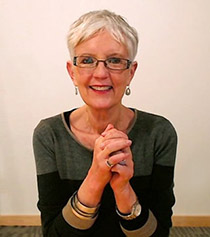Strategies to Treat Patients Trapped in the Freeze Response
 |
with Bessel van der Kolk, MD;
|
 |
with Bessel van der Kolk, MD; Stephen Porges, PhD; Ruth Lanius, MD, PhD; Pat Ogden, PhD; Thema Bryant-Davis, PhD; Bethany Brand, PhD; Deb Dana, LCSW; Janina Fisher, PhD; Kathy Steele, MN, CS; Ruth Buczynski, PhD
Sign up for the Gold Package

This is a learning community for practitioners. We can’t wait to hear what you’re going to use with your clients
But please do NOT:
- seek advice for personal problems
- ask for referrals
- post links or advertise a product
- post about technical problems
wonderfull i will use the strategies that. you show us, i understand and i can see much better the freeze response , and i can do something to treat to my clients , thak you so much
Thanks for the great pointers and tips to help my patients that I work with.
I have been working with a very traumatised patient and can really see myself utilising these strategies more effectively by adding to my own toolkit to help her better in these frozen states especially looking more at utilising micro-movements.
I also really want to give a try with the pulse oximeter – I have just the patient to use this with as reflecting on her presentations, it certainly has given me food for thought.
Thanks so much
I find that the roadmaps are very challenging to use, because I am trying to process the info, while trying to find the section & fit it in (often not enough space). So I tend to take my own notes, which is also challenging as the processing of very quickly disseminated info.is hard to follow & also write notes. The reason is that I have complex trauma at the severe end of the scale from long-standing severe domestic abuse (while also having a professional background). So I may find myself feeling triggered, causing me to miss some of the info, then feeling inadequate & self-shame (not good enough). It is a constant circle of enormous frustration. Also trying to apply the info. on Freeze on my adult son (this occurs frequently occurs for him, as he also took the brunt of domestic violence (for his entire life). It is very challenging for me to apply trauma treatment concepts to myself & my son (not viable). However, we are also not able to afford private trauma-trained therapy, starting at $350 CAD & upwards, since we may each need the indefinitely, & we are both on fixed govt incomes . After so many years of trying the best to manage severe trauma, we are not making much headway, due to ongoing significant trauma triggers (from past & a LOT occurring from current living condo situation). Feels like a LOSING battle & we are feeling very despondent, as I am a senior & my son is an adult, who has a number of other diagnoses directly related to trauma!!
Any suggestions welcome from anyone, regarding resources to check in Oakville, Ontario, Canada. To date I have NOT had any success finding the right type of trained therapist, who is a good fit & also affordable. I detest being in the “have-not’s category financially”, as it precludes us from getting any where with trauma. This leaves us with a very poor quality of life, isolated due to our traumas. NO WIN situation
Thankyou so much!
I’m a creative arts therapist, and have plenty of helpful take-aways from the session today. Eg with a current child client I have , taking a slower approach through micro-movements before larger movements, reframing the freeze response positively, and I am affirmed in using my symbols/images/art making/movements etc to provide less direct, verbal means of expression.
I am attending this series as I have suffered from trauma as has my daughter. I am not a practitioner in this field, but, rather, in education. I am hoping that what I learn in this series will give me ideas for working with my present therapist and the support group that is part of this therapeutic experience. Specifically, my therapist is utilizing DBT. I will also share what I am learning in this series with him and see if we can integrate any of these ideas/strategies/approaches into our work together..
Thank you for the information about low oxygen levels. I plan to purchase a pulsometer and use that to monitor regulation.
Thank you so much for the new information and validating some of my approach with clients 😊!
I will use the strategies to help move a client from freeze in particular the somatic movement piece. And will take note of the don’ts
Thank you for your commitment to helping those afflicted with Trauma. I found the video today so helpful. I will be purchasing your helpful videos. Thank you.
YS
This program is already being such a big eye opener for me and my practice as trauma psychologist. I am hoping it will enable me to help some of my clients in a much more effective way that will alleviate suffering I was dispairing to achieve with more complex trauma survivors. Thank you so much for putting it together and in such a compassionate way that enables me to watch it at different times during each day. I can’t thank you enough. I hope I will be able to buy the gold package before the end of the day.
I am a physical therapist and a Feldenkrais practioner. This was so helpful. Thank you.
Thank you for the great content ! I wonder if mentioned techniques could work with cPTSD clients too?
Thank you for this very enriching resource. As a professor I see students from all walks of life – many of whom have frozen in front of me. I love the research that encourages addressing a freeze as a gift. I will incorporate this feedback with future students and families who seek me out. Thank you.
Thank you for this incredible resource. Beautifully crafted and curated, with the world’s leaders’ perspectives woven into a coherent narrative. A pleasure to watch!
Well done by all presenters. A lot of Knowledge, Competencies, and Skills were conveyed during the session. Ron Klein, PhD, ABPP/
PSYCHOLOGIST
Thank you very much, so generous to have a free option for such high quality. Really valuable learning was: avoid eye contact and touch, but use voice to stay connected; helping client to recognise early patterns towards freeze where movement is still there; using visual awareness eg. focusing on objects in the space; using breath awareness and techniques to regulate autonomic nervous system; developing body awareness where triggers might be identifiable; focusing right brain to right brain exchange as being somatic as opposed to verbal: considering that person is not choosing to stop speaking but is unable to do so; validating the freeze response and a natural defense mechanism, and not seeing it as having been a negative thing that happened at the onset.
excellent summary and feedback
hello
this is very helpful.! I didn’t catch the part where you can help your clients when they are not in your office. might it have been skipped?
thank you
This was very informative, well-presented and useful. Thank you! I am a coach for musicians and guide people on how to practice music. The freeze response is very common in music learning, practicing and performing, so everything presented today is valuable to me. Thank you again!
We work with traumatized victims of scams & fraud and see everything you describe. We are not psychologists, so we have to limit what we can do with each survivor, but informing our process is critical in effectively guiding victims to the support and help they need.
We would love to talk with you about a program more geared towards crime victims and their unique needs.
Tim McGuinness, Ph.D.
SCARS AgainstScams.org drtim@AgainstScams.org
Thank you for shareing.! You are amazing!
💖
hello
this is very helpful.! I didn’t catch the part where you can help your clients when they are not in your office. might it have been skipped?
thank you
Elke Rafferty
I am a Life Coach and Executive Coach, I live in Caracas, Venezuela and I am immensely grateful for this valuable opportunity to learn from the great professionals of this program on this very important topic of trauma.
I do not have the means to pay for this valuable knowledge to myself and my clients and relational environments.
I perceive in this Program and in its people a great love, compassion and awareness of what they are delivering to the world.
THANK YOU!!!!!!!
thank you very much for the most educational and practical sharing it is indeed beneficial both personally and professionally. The idea is what I will use for myself personally and also as I practice my profession. To the management and staff of NICABM keep up the good works you are doing. Again thank you and God Bless…
This was amazing information on freeze response. I will start looking at signs of freeze during sessions.Thank you for continuous research and collective information sharing through this platform. Much appreciated.
the information shared was so helpful. Thank you.
Bouncing off of a previous comment, I am thankful for these considerations working in the remote teletherapy space. It can be difficult to determine what a client may be physically experiencing when not sitting with them in person and if they are unable to verbally express what they are feeling in the moment. Excellent reminders and recommendations on moving the client through discomfort or triggers in session.
I feel this program should be offered as required training for medical practitioners in oncology. Especially post-pandemic. Not only would it be helpful to patients, but also to clinicians in this setting.
Thank you all for such a Gift!! This class will help so many people here in Brazil.
I’m so grateful…
Thanks for today, many insights – very helpful in my current environment.
For me, adapting some of these interventions via a virtual platform vs being in an office will require additional conception. However, I am so thankful for the latest strategies shared.
Thank you SO much for this excellent session! Im going to try to use the very practical ideas you gave. I Work mostly with children who have been abandoned or abused(child welfare – South Africa). I would love a session on treating children with severe trauma. Wish I could afford the gold package.
This is the real deal. At its best, psychotherapy is a practice of helping people bring their conscious, loving, presence to previously uninhabited nooks and crannies. This is the way.
Great
Such excellent video editing – I experienced it as if a conversation amongst a group all committees to expanding our awareness and capability. And appreciated the gold package being flagged but not forced. I hope this series brings those who created it much benefit, fulfillment and appreciations. Deep bow.
Gracias
Thanks! I agree with many of the previous comments that the training is well structured. Very thoughtful.
loved the story of the deep pressure trained dog <3
Pat Ogden is on point when she talks about how people explain their entire story and history in their physiology without saying a word. And how the therapist's expectations and doubts will be conveyed in the therapist's physiological presentation and basically their vibes will affect treatment – also spot on.
I am also impressed with Deb Dana's use of her nervous system to regulate others. I do this intuitively to some degree, but sometimes I am preoccupied with my own troubles during a session and this is no doubt picked up by the client's nervous system. So my big takeaway for use in my practice is to practice more self-care outside of work to make sure my own nervous system is regulated, congruent and present so I can be more adaptable when I am urgently needed to regulate someone else's nervous system.
Thank you for this and all the informative, quality trainings you offer. I am still learning even after working in trauma for over 30 years. The subtleties are so important. I am working with a lot of veterans and women, and I facilitate 2 groups of nurses in recovery, many of whom have experienced trauma in various forms. This knowledge will be very useful for me to use. Unfortunately, I cannot purchase the gold package, although it seems well worth it. Blessings to you all.
Thanks a lot. Nobody ever explained to me the natural freeze response to stress so well. It’s so important therapist can explain it to survivors, in order to free them from shame and guilt. Thanks a lot from Spain.
Thank-you so much for making this free part of the series so deeply meaningful! I very much appreciate the DO NOT DO section at the end. Instinctively i don’t touch people unless i have their consent, but I love that I can now assert this information to other community members, including law enforcers in my work and living community.
I have an unrelated question, and maybe it is for further along in the sessions.
Q: does anyone have any experience with someone who gets panicked by the brain falsely detecting high blood carbon dioxide consentrations? I read just once about this phnomenon existing independent of a history of trauma, but i still wondered if medical trauma, for example life threatening asthma attack over several days, could leave the brain being “trigger-happy” re CO2.
Turning 50 this year, having discovered my heavy CPTSD condition after a life filled with toxic relationships and narcissistic abuse, I
am currently beginning a whole cursus towards a radical turn in my professional life.
Being well on my way to a global positive transformation (finally becoming my Self) I now aim at becoming a professional counsellor, walking alongside people suffering from CPTSD to help them access their own issues and find within themselves the resources they necessarily have to leave their state of numbness and move towards their own transformation.
Resources are scarce here in France and I am so delighted and thankful such quality content is being brought to the world for free!
Please be assured I will make the best out of it on my journey.
In due time, I shall surely put into practice all these wonderful tools and experiences, for the betterment of all people in need of guidance I will have the honour and privilege to walk along with.
Wholeheartedly,
Franck (Dijon, FRANCE)
Just attended the first session and wanted to say thank you for providing the opportunity to access this for people who have financial barriers. Having dealt personally with psycho/cognitive therapists with misconceptions or lack of trauma education and treatments, it has been frustrating delaying and causing more pain and trauma and disassociation that I stopped therapies until I find a therapist who has proper trauma training and change of perception. Patients are not the problem or a problem to be solved but experience to happen. A change of perception needs to happen clinically and socially. Thank you
thank you again. I could not have healed as much as I have and learned so much about Why , I am the way I am. I can release so much shame that ‘ I never amounted to anything’ . I have done far more than my broken family. I Am The Change
have recently discovered than Autism may be a contributing factor in why things are harder for me than most and why I have extreme Sensitivities
I have purchased a fair number of your amazing programs but cannot afford more.
eternally grateful for the free ones.
I cannot get counselling here in Canada due to overwhelming demands and my history scares therapists. I am on a fixed income therefore cannot afford Real Therapy ( not government guided).
You have helped me to want to keep reaching for equanimity with Self and I feel less Feral which truly helps to stay in the moment more often.
I’m really touched by your work. As a trauma survivor I never got proper attention in my country, and in many times I got the wrong treatment. So I really thank you for spread this knwoledge.
Validation and acknowledgement of a clients’ trauma is very important. Today’s session reminded me of a session I had with a client earlier today where she had an a-ha moment. She realised that the trauma responses she gets served her well in the past, however she now has the control to be aware of these responses and work on developing new ways of responding to situations (in her own time). That awareness alone helped her move beyond being stuck in her past memory to being able to interact with the memory from her point of view in the present. She did not have to share the memory with me in order to realise this. That is also something that was mentioned today. Thank you so much for sharing this course with us! It is much appreciated.
I am very grateful for this opportunity. Excellent content and excellent professionals. You should have payment options to make this more accesible for the professionals with financial strain.